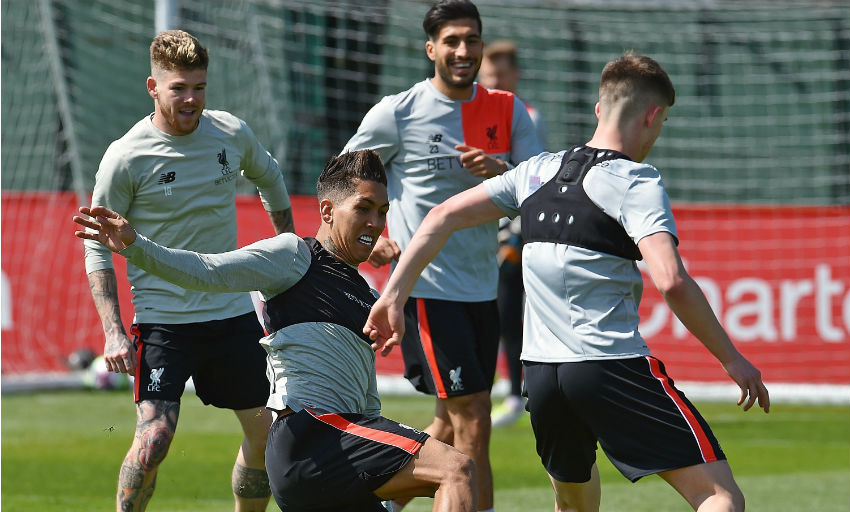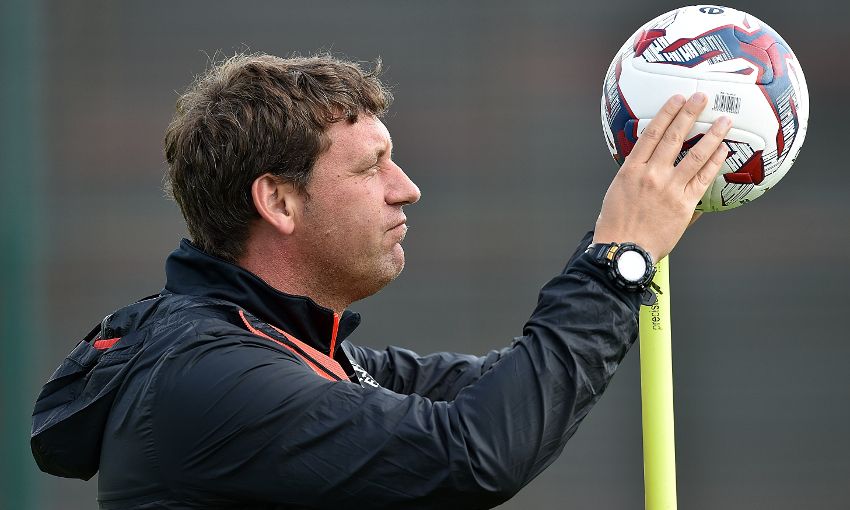Behind the Badge: How Melwood training sessions are designed
There is a moment at Melwood each week when Peter Krawietz becomes convinced Liverpool are ready to win their next game.
“You have this point,” says Jürgen Klopp’s second assistant coach with a nod.
“Even if maybe two days before you think ‘How can this work?’, at the end – always – after sitting together, after watching the video, after the team-talk we are always confident that we can win. If there is one possibility to win then we try it very hard.”
Krawietz has spent the previous 20 minutes explaining exactly how the Reds’ training sessions are choreographed by he and the coaching staff, for this latest edition in Liverpoolfc.com’s ‘Behind the Badge’ series.
As the German maps out the timeline of a typical week at his West Derby workplace, it’s near the summary’s conclusion that this feeling of considered optimism spills out.
“We have a video meeting before the last session,” he notes.
“Of course, the coaches need more information than the players. They need the right information. It’s always about solutions.
“We try to give the information as short as possible, as exact – but in the right way, not too much. We know we play the next opponent and they are strong here, strong there and unbelievably strong there!
“But we try to give the information for solutions, so at the end – after every video meeting – we are sure we can be the winners. Of course, it doesn’t work every time, but this is what we try.”

“I want to learn every day. This game is so big, so interesting and so flexible. It’s never boring. It’s always ‘we can do this better’ and developing systems. This is why it’s so interesting.”
When Klopp took the reins at Liverpool in October 2015, both Krawietz and Zeljko Buvac – his right hand men at Mainz and Borussia Dortmund – were fundamental parts of the package.
And, again, when the club moved to hand the manager an extended long-term contract ahead of the current season, agreement came with the prerequisite that his assistants were given the same treatment.
“There was no other chance,” said Klopp last summer.
The pair prefer the background, rarely conducting interviews with the media.
But time with Krawietz reveals that beneath the calm, relaxed exterior is a man besotted not just with the game of football itself but with cracking its code, with playing a part in discovering the secrets that can secure victories and success.
“Training is a mixture between hard work and fun,” says the 45-year-old.
“The best thing is to work hard and have fun – but work is the most important [thing] for us, always focused and always concentrated during these 90 minutes every day.
“We try to improve our players and we try to improve our team. We always think, and we are completely convinced, that you can get better with good training.
“To stay physically strong, to get stronger, to work on your tactical ideas, to work on your technical skills – we try to always put this in every day. Everything we do follows an idea and a target: to get better, to play better football.
“You try to bring the players to a certain level physically and then you have to watch week by week by week, every week, what happened in the game.
“What do we need the next time? What do we have to change? What do we have to improve? Is it the defence? Is it the attack? Most of the time it’s both! It’s never boring.
“Maybe the exercises are similar, but you always have different points in a special way where you can improve. So even after the best game, we never say it’s not possible to be better. We always keep improving and keep going.”
“We sit in the dressing room and talk about what was good and bad. We’ll try to give different information or different exercises, always processing every day – every minute!”
The absence of European football has afforded Krawietz and co much more time on the training pitches this season.
Liverpool’s final Premier League game of the campaign, against Middlesbrough at Anfield, will be their 47th fixture in all competitions. In 2015-16, they played 63.
The coach is certain the Reds have used the increased hours at Melwood beneficially, and should they complete the objective of Champions League qualification in the remaining three matches few would argue it has not been a campaign of progress.
So, what does a full week’s worth of training look like at the elite level?
“Every session is different. It depends which day of the week we are on,” states Krawietz.
“With a match on a Saturday, we will have a training session on Sunday morning where the players who played 90 minutes will have recovery and the players who didn’t play will have a ‘load’, as we say, so they train similar as for a game with small games. For them, it’s a little harder.
“If we have a long week then Monday is off. On Tuesday morning, we start with stability training, so it’s physical and a few passing exercises. Tuesday is the day with two training sessions – in the afternoon, again starting the week with small games.
“Wednesday is the session where we start the special preparation for the next game on Saturday, with a unit 11v11 – not a full game, of course, but finding different situations where we simulate the 11v11 on the whole pitch.
“On Thursday, we continue to prepare the game, especially with finishing exercises – shooting on goal, playing crosses, with a tactical background.
“Friday’s session, the last before the game, we train set-pieces and the famous game in our squad: old v young. It’s a competition over the whole season, where it’s always the 11 youngest against the 11 oldest. Then we are prepared, in most cases, for the game.”
LFCTV GO: Watch pre-Southampton training at Melwood
Sessions are between 60 and 90 minutes in length, never more than an hour and a half, with Buvac the one who typically ‘decides what we train, how we train it, how long and so on’.
The physical fitness coaches lead the players in their warm-up, while Pepijn Lijnders – first-team development coach – is tasked with outlining the aims of the particular drills and exercises.
Analysis is conducted as the workout is happening, informing the coaches’ understanding of which areas may need further work or which ideas should be tweaked.
“Like always, it’s teamwork,” Krawietz continues.
“We have a monthly plan. We know when the games are, so then we try to make a plan for the next few weeks. Of course, it is flexible because sometimes we have to react to different situations.
“The special sessions are already flexible. We plan before the training sessions. We know the background of how we want to train, but how it is exactly we do just shortly before the session.
“As long as you are healthy and fit, we want that everybody gives his best. Not always 100 per cent physical, because it is our responsibility to bring the players through the week. They can’t always be [full throttle], it’s not possible.
“But we have our ideas and we want the players to follow these ideas. Then we are pretty sure they will be in good shape on the weekend.”
Behind the Badge: The series so far
The coach, the core and the mirror>>
'My job is like a never-ending search for perfection'>>
'Jürgen wanted to know about my coaching history'>>
'My philosophy is very similar to Jürgen's, weirdly enough'>>
'My dream? To play a small part in LFC winning a trophy'>>
'Klopp and LFC can inspire action on social issues'>>
The pathway to planning LFC's travel>>
'My work at the Academy is incredibly rewarding'>>
Manninger on Arsenal, Wenger and his LFC role>>
'We teach kids around the world to play The Liverpool Way'>>
‘Solutions’ is a word used often by Klopp during his pre-match press conferences – specifically the need to find them against the next opponent and the style of play they employ.
It is a recurring theme in conversation with Krawietz, too.
Creating automatic behaviours through repetition in training, while learning more and more about your teammates’ natural traits and decision-making, is crucial to finding space and unlocking defences on a matchday, he explains.
“When we need to perform under the high pressure of a game, with an opponent who wants the complete opposite of what we want, it’s helpful,” says the coach.
“Not always from A to B to C, but what we want and what we always try with everything we do is to help them find the right solutions.
“During training you can prepare solution-finding during the game, then everything has to fit and at the end you score a goal or whatever.
“The most important thing for everything in football is that a minimum of two players have the same idea at exactly the same time. This timing is why you train, where you learn how your mate is running, how quick he is, where he will run – always remembering what we want.
“Therefore, training is unbelievably important. It’s all about preparing spaces on the pitch.
“Every football team in the world wants to defend compact, but even then you have to try to score and of course there are possibilities and solutions. We try to improve this timing with everything.”
And move a step closer to cracking that code…
‘Behind the Badge’ is a regular feature on Liverpoolfc.com which aims to tell the individual stories of the numerous men and women who work tirelessly away from the spotlight in an attempt to make Liverpool FC successful.
We speak to various members of staff across the first-team, Academy and Ladies set-ups who dedicate their lives to the club each and every day, covering a variety of different roles that make a vital contribution in preparing the Reds for action.




